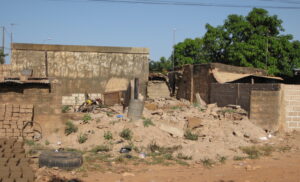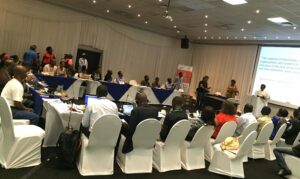Women all over the world account for 50% of the population but still have not achieved true equality 20 years since the Beijing Conference. For example globally only half of women participate in the labor force, compared to three quarters of men. Even when women are employed, their pay is still lower for the same work done by their male counterparts and the quality of the jobs most are employed in is lower.
Progress towards achievement of Agenda 2063, Africa’s development vision and plan, is closely linked to women’s empowerment due to the cross-cutting impact of women’s empowerment and gender equality. From healthcare and education to economic growth and security it is clear any development paradigm that leaves women and youth disenfranchised will fail to deliver on any development ideals envisioned. This is one reason why African states ratified and brought into force the Protocol to the African Charter on Human and Peoples Rights on the Rights of Women in Africa, also known as the Maputo Protocol. Through the Protocol, African Union member states implemented a normative framework through which we can ensure progress in women’s empowerment and broader gender equality is realised across the continent.
“The revolution and women’s liberation go together. We do not talk of women’s emancipation as an act of charity or out of a surge of human compassion. It is a basic necessity for the revolution to triumph.”
Thomas Sankara
Domesticating this treaty is no doubt a human rights priority. But it also has economic benefits for the continent. Africa’s population is more than 50% female with more than 60% above the age of 15. However, female labor force participation rates are much lower than those for men especially in the non-agricultural sectors. Article 13 of the Maputo protocol has fairly specific provisions designed to ensure women are able to contribute to economic growth to the same extent as men. Article 13(e) states that state parties shall “Create conditions to promote and support the occupations and economic activities of women especially informal sector.” If those conditions include improving the ability of women to join the labor force or grow the number of women in both the formal and informal sectors earning decent wages, the impact on the economies of African countries could be profound.
This could be even more profound for governments in the global south, especially Africa, within the context of financing for development. While the commitments on overseas development assistance (ODA) must be pursued in light of the Monterrey Consensus we must raise our level of ambition and appetite for innovation in regard to domestic resource mobilisation. We need to innovate away from pure reliance on increasing the tax base to include aspects of economic empowerment that improve productivity within the existing tax brackets.
For instance, available data for the five East African countries show women in general seem to have a lower labor force participation rate than men. In Kenya, the rate was estimated at 62% (ILO estimates) which translates to approximately 6.9 million women aged 15 and above out of an addressable 11 million women (Kenya Population Census – opendata.go.ke). Measures that create opportunities for an additional 1 million women (or a 10% jump) to enter the tax bracket at the current entry wage level could result in an additional KSh12b ($126.32m) for mobilisation domestically, enough to fund the sub-national Kajiado and Machakos county governments for an entire year. This back-of-the-envelope calculation doesn’t take into account the other effects of empowering women economically which include better education, health and nutrition outcomes for children due to the spending patterns of women compared to men all of which would result in improved development outcomes.
The idea is not to simply instrumentalise women within the economy but to approach domestication of the Maputo Protocol as an effort to strengthen and safeguard, without exception, the social and economic rights of women in Africa while recognising the value delivered for all. This means African states shouldn’t pick and choose which aspects of the Protocol to domesticate and which ones not to. The same level of effort should be applied in order to deeply domesticate it, as well as other normative frameworks on the continent, as a clear pre-requisite to human development and prosperity.
As governments negotiate the Addis Accord in the run up to the 3rd International Conference on Financing for Development to be held in Addis Ababa, Ethiopia, it will serve us all well to ensure the social and economic rights of women and youth are prioritised within the new framework. This will not happen when financing for development is outsourced to the private sector or disincentives are designed to discourage governments from investing in public goods such as healthcare and education infrastructure or human capital development. Shifting the balance of dependence away from ODA and towards domestic resource mobilisation will give Africa the foundation it needs to pursue its own indigenous development agenda with less risk of capture from western interests. Africa already has a framework that can ensure the post2015 development agenda works for women and young people, we don’t need a new framework/instrument/treaty to do that. What we need is renewed energy to ensure they form part of our reality as a people.
Read the Maputo Protocol here.
Data sources: data.worldbank.org and opendata.go.ke



